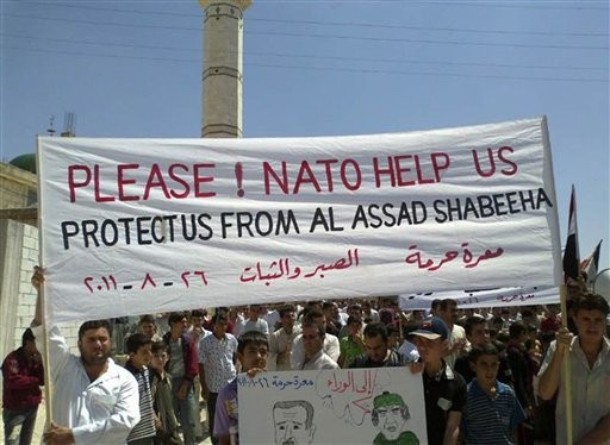
From James Joyner, the New Atlanticist: Among the explanations given for why the West intervened in Libya but has thus far stayed out of the far greater crisis in Syria has been the lack of regional support for action. That excuse appears to be nearing its expiration date.
As NATOSource reported earlier today, the Arab League has asked Britain and France to lead an international response.
Deutsche Welle has details: Britain and France have been approached by senior Arab League officials about taking the lead in a Libya-style contact group which would coordinate the next phases of action against President Bashar al-Assad, and plan for what many regard as his inevitable departure from power. . . .
[G]iven that there’s little appetite among Western publics for yet another war, the lack of a legitimating UN imprimatur may well be sufficient cover for refusing to act.
But the alternative choice appears to be to allow a full-scale civil war to break out, with massive civilian casualties sure to result. Hannah Allam for McClatchy: "When you see what’s going on in Syria now, you see a civil war in the future," said Rami Abdel Rahman of the London-based Syrian Observatory for Human Rights. "The Syrian regime keeps killing people and no one’s protecting these people. In the end, the people have to protect themselves."
The United Nations says that pro-regime forces have killed more than 3,500 protesters since mid-March. Last weekend, the Arab League suspended Syria’s participation over the crackdown and has demanded that government forces stop their attacks on peaceful demonstrators by this weekend. . . .
So, things are coming to a head. The level of violence has reached a level that’s impossible to ignore, arguments for why the vaunted Responsibility to Protect doctrine don’t apply are wearing thin, and the regional powers that be are on the verge of asking the West to live up to its stated principles. And, unlike Libya, there’s a very real argument that American national interests are actually at stake here.
Yet everything else conspires against action. The West is in the midst of the greatest economic crisis in generations and cutting spending to the bone. A decade of fighting in Iraq, Afghanistan, and elsewhere have left all concerned weary of war and, in many cases, severely under resourced. Oh, and there are elections coming up in Italy, France, and the United States.
James Joyner is managing editor of the Atlantic Council. AP Photo.
Image: syria-nato-please-help-us.jpg
